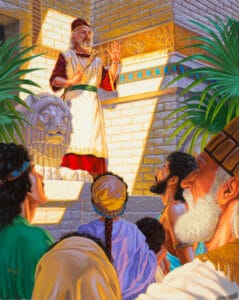Daily Lesson for Sunday 20th of April 2025
Eden was created as the ideal home for the human race. Once sin entered, God had no choice but to separate humanity from the Garden and the tree of life, at least for now.
Outside of the Garden, humans were required to work hard to provide for their own continued existence. Life became harder; we had to live with pain and by the sweat of our brow (Genesis 3:16-19). Our first parents trusted that the rightful King would provide a path back into the Garden, and they brought sacrifices to the gates of Eden in faithful anticipation of the redemption that God, right from the start, offered the fallen world.
“The Garden of Eden remained upon the earth long after man had become an outcast from its pleasant paths. . . . Hither came Adam and his sons to worship God. Here they renewed their vows of obedience to that law the transgression of which had banished them from Eden. When the tide of iniquity overspread the world, and the wickedness of men determined their destruction by a flood of waters, the hand that had planted Eden withdrew it from the earth. But in the final restitution, when there shall be ‘a new heaven and a new earth’ (Revelation 21:1), it is to be restored more gloriously adorned than at the beginning.”—Ellen G. White, Patriarchs and Prophets, p. 62.
Others, however, worked on man-made “solutions” to our newfound problems, and we see the birth of city-states, an attempt to create an easier life, and perhaps to try to recapture what was lost in Eden.
Read Genesis 10:1-12. This is where the Bible introduces a number of key political players found throughout the rest of the Bible, including Nineveh and Babylon. Given what we know about the roles of those cities later on, what can we deduce from these texts?
Some have read about Nimrod and concluded that he is a noble hero, much like the conquering heroes of pagan mythology. But when the Bible describes him as “a mighty one on the earth,” and a “mighty hunter before the Lord,” it is not a compliment. Nimrod is great in his own estimation, and he stands “before” the Lord in the sense that he defies God. What we see in these texts is the spreading of the rebellion against God, a rebellion that will exist until, ultimately, all rebellion will be forever eradicated.
|
Why is the sin of rebellion against God more subtle than we might realize? How can we protect ourselves against this very human trait? |
 (0)
(0)



